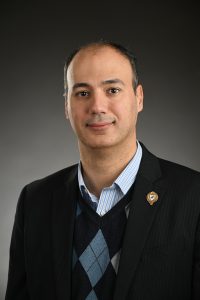After successfully holding a weeklong summer camp for middle and high school students last July, Fordham was once again awarded a prestigious grant by Gen Cyber, a program jointly run by the National Security Agency (NSA) and the National Science Foundation (NSF), to hold another camp next summer.
The $150,000 grant will fund a camp to be held in July 2023, geared toward students from minority communities in the Bronx.
University Professor Thaier Hayajneh, Ph.D., founding director of Fordham’s Center for Cybersecurity, said the focus of the camp, which will be held in person for the first time, will be on educating students about cryptography and cryptocurrencies.

The previous camp was held virtually and focused on mobile phone security. Because the pandemic made in-person meetings unfeasible, Hayajneh and camp organizers mailed iPhones and Samsung phones to participants and led them through exercises via Zoom sessions. Students were also mailed t-shirts, gift cards, and food vouchers.
“Throughout the camp, we taught them the principles and the basics of cybersecurity in the beginning, and then they practiced those principles and concepts on an actual system—in that case, it was the smartphones. We didn’t want them to ruin their own phones or their parents’ smartphones,” he said.
To make it more enjoyable, organizers encouraged students to make and exchange videos of themselves conducting exercises with the phones they were sent. An agent from the FBI also shared details from a real case involving smartphone security. In surveys conducted at the camp’s conclusion, many students indicated a strong interest in pursuing a career in cybersecurity.
Cryptocurrency: Good Hype and Bad Hype
In focusing on cryptocurrency for next summer’s camp, Hayajneh said the goal is to shine a light on an area that has both tremendous potential and potential risks.
“Even my 8-year-old has asked me about Dogecoin. Kids hear about it from their friends and want to know how they can buy cryptocurrencies. We don’t want teenagers to fall victims to scams and other malicious activities that could target them in the future,” he said.
In addition to teaching students the basics behind Blockchain, the technology that makes cryptocurrency possible through security, transparency, and traceability, instructors will explain how cryptocurrency can be used for nefarious purposes, such as ransom payments.
“There’s good hype and bad hype about cryptocurrencies, so we’ll introduce the students to it, and also make them aware of the value and risks,” he said.
“Unlike banking, where if you make a bad transaction, you can call your bank and tell them it wasn’t what you did, or they made a mistake, with crypto, once a transaction happens, it’s done. You can never reverse that. So that’s one of the scary things about it.”
The second grant for a new session of camp is further validation from the NSA of Fordham’s leadership in the field, Hayajneh said. In 2017, the NSA designated the University a National Center of Academic Excellence in Cyber Defense Education (CAE-CDE).
“One of the main goals of Gen Cyber is to increase the interest in cybersecurity, and hopefully many of those kids that are tech-savvy become ethical hackers,” he said.


